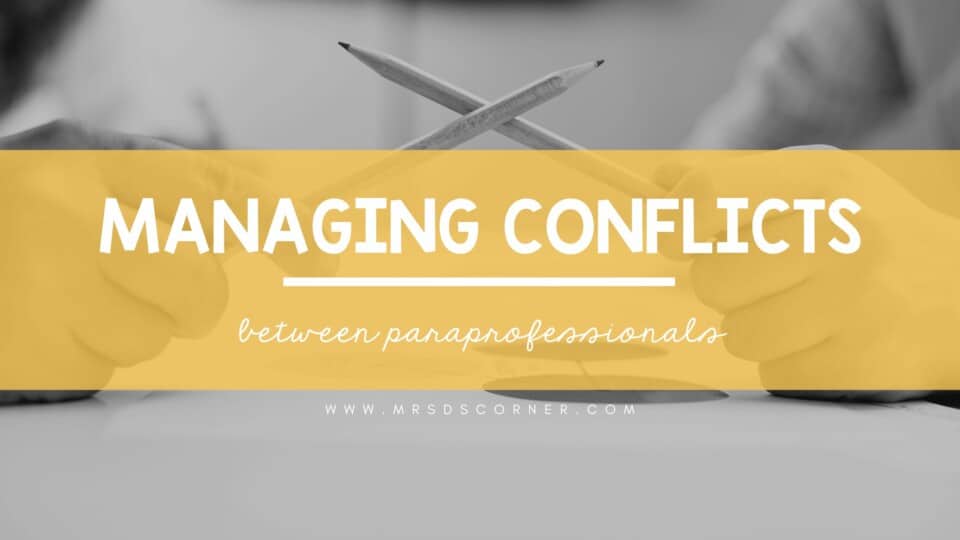Managing conflicts between paraprofessionals in the special education classroom is a challenging but necessary task. Paraprofessionals must work together to ensure that students receive the best learning experience possible, and this can be difficult when disagreements arise.


It’s important for teachers to recognize potential conflicts early on and address them before they escalate. With proper training and guidance, paraprofessionals can learn how to manage their differences in opinion while still collaborating effectively with one another. In this article, we will discuss strategies for managing conflict between paraprofessionals in the special ed classroom so that everyone involved can have a positive experience.
Strategies for Managing Conflict Between Paras
Establish Clear Expectations
It’s important for both paraprofessionals and teachers to have a clear understanding of their roles and responsibilities in the classroom. When everyone is on the same page, it makes it easier to collaborate and avoid potential conflicts.
Questions that can be asked of a para to determine if they understand their expectations include:
• What tasks have you been assigned to do in the special ed classroom?
• How do you plan to fulfill those tasks?
• How will you collaborate with other paras in the classroom?
• How will you ensure that all students receive the best learning experience possible?
Encourage Open Communication
Communication is key when managing conflict between paraprofessionals. By encouraging them to share their ideas and perspectives openly, they can work together to find solutions that are beneficial for everyone involved.
One way to encourage open communication between paraprofessionals is to create a safe and respectful space for dialogue. This can be accomplished by providing a comfortable place for paras to discuss their opinions without fear of judgment or criticism from others. Additionally, teachers should make sure that everyone is heard and that each para has an equal opportunity to express their thoughts and feelings.
Another way to encourage open communication is through active listening. Active listening involves being attentive to what others are saying while also providing feedback and engaging in discussion. This type of communication helps foster understanding between different perspectives, which is essential for managing conflicts effectively.
Model Positive Behavior
Paraprofessionals should be reminded of the importance of modeling respectful behavior towards one another at all times. Setting a good example will help foster collaboration and cooperation among team members, which is essential for managing conflict.
Encourage Collaboration
Having paras work together on a project or activity is a great way to foster team building and collaboration among members of the staff. This can help build trust between paraprofessionals, which will make it easier to manage any potential conflicts that may arise in the future.


Listen Carefully
Listening is an important part of effective communication, both in and out of the classroom. By taking time to really listen to what each paraprofessional has to say, it can help facilitate better understanding and compromise between them.
Provide Support
It’s important that both teachers and paras provide ongoing support for one another so they feel comfortable coming forward with any issues they may have. This can help prevent conflicts from escalating and allow everyone to work together more effectively.
Get Admins Involved if Necessary
Remember that at the end of the day, paras who choose not to do their job should be referred to the administration. It is not the classroom teacher’s job to make sure that everyone is taking responsibility for their own actions.
Be Aware
It is also essential for teachers to be aware when conflicts arise and intervene quickly before things escalate further. Teachers should provide guidance on how to resolve disputes constructively, reminding paraprofessionals of the importance of communicating openly and respectfully. If necessary, teachers can also provide mediation or other forms of support to help resolve the issue.
Take Responsibility
It’s important for paraprofessionals to take responsibility for their actions and recognize that they may be in the wrong at times. This will show respect towards each other, which is essential for successful collaboration.
Paraprofessionals need to be reminded of the importance of collaboration and communication in managing conflicts effectively. They should model respectful behavior towards one another, actively listen to each other’s perspectives, encourage open dialogue, and take responsibility for their actions.
By utilizing these strategies, paraprofessionals can work together more efficiently while providing students with the best possible learning experience. If necessary, teachers should get administrators involved if disputes cannot be resolved on their own. With proper guidance from educators and respect between team members, paras can create a collaborative classroom environment that promotes positive outcomes for everyone involved. Managing conflicts can be done!

